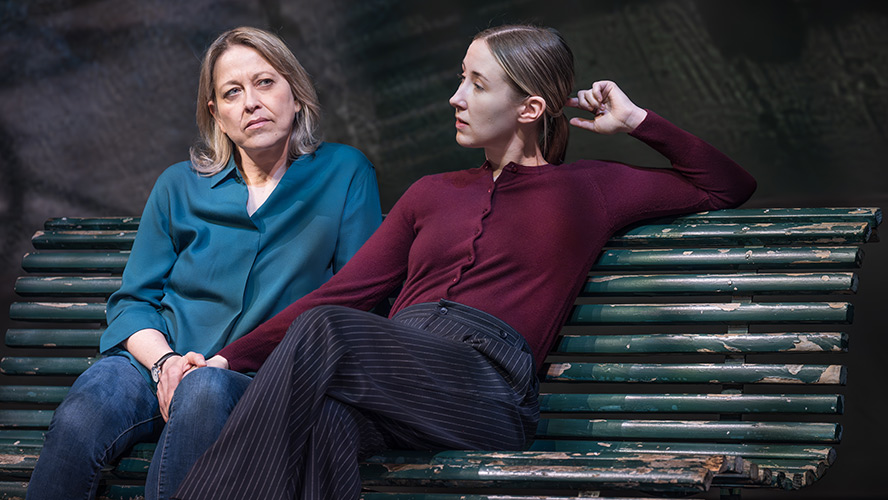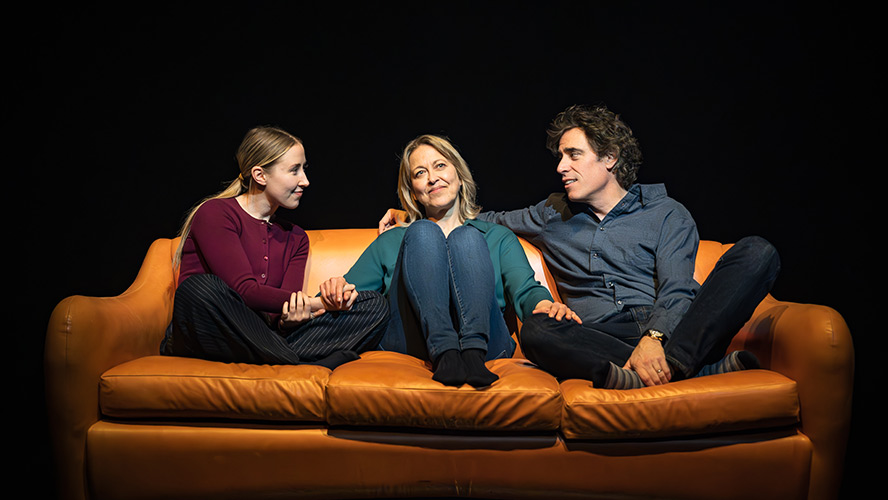There’s something a little odd about sitting in a West End theatre, surrounded by the hum of anticipation, and realising you’re about to watch a play called Unicorn. Not a musical, not a revival, just a straight-up new play about sex, marriage, and the sort of midlife malaise that’s probably more common than people admit. I have to say, I didn’t expect to laugh as much as I did. Or to squirm quite so often.
Unicorn is Mike Bartlett’s latest, and if you know his work (Cock, Bull, King Charles III), you might already suspect you’re in for something sharp and a little uncomfortable. This one’s a comedy-drama, but ‘comedy’ might be misleading. There are jokes, yes, and plenty of clever lines, but the laughter often feels like a release valve for something more anxious simmering underneath.
The set-up is simple enough: Polly (Nicola Walker), a poet and teacher, and her husband Nick (Stephen Mangan), a doctor, have been married for 25 years. Things have gone a bit stale. Enter Kate (Erin Doherty), Polly’s much younger student, who’s magnetic in that way some people just are. The idea of inviting her into their marriage comes up-almost as a joke at first, then as a real possibility. The term ‘unicorn’ gets explained, and if you haven’t heard it before, you might feel a little out of the loop for a second. The word refers to a single woman who joins a couple’s relationship: rare, maybe even mythical, hence the title.
What’s interesting is how little the play is actually about sex, at least in the way you might expect. The characters talk about it a lot, but the real action is in their conversations: how they circle around what they want, what they’re afraid of, and how easily people can fool themselves. Walker is fantastic as Polly. She makes you believe every flicker of doubt, every flash of longing. There’s a moment where she tries to articulate what she wants, and you can see her almost convincing herself, then losing her nerve, then trying again. It’s funny, but also a little sad.
Mangan’s Nick is harder to pin down. He’s clever, self-deprecating, and just awkward enough that you root for him, even when he’s being a bit obtuse. There’s a scene where he tries to compliment Kate’s clothes and ends up sounding like someone’s dad at a festival. It’s cringe-worthy, but oddly endearing. Doherty, as Kate, is a bit of a mystery. She has this calm, almost unreadable quality, which works for the character, though sometimes I wished we got more of her inner life. She’s there to shake things up, but the play doesn’t always let her be more than that.
The direction, by James Macdonald, is tight but not showy. The set-a sort of ribbed dome that opens and closes-feels a little abstract at first, but it grows on you. It’s like the characters are living inside a shell, or maybe a ribcage. The lighting can be a bit much-there are moments when it’s almost blinding-but it does add to the sense of discomfort. I’m not sure if that was intentional, but it stuck with me.

One thing that surprised me: for a play about desire, there’s very little actual heat on stage. The characters talk around their feelings more than they act on them. Maybe that’s the point. Maybe it’s about how people intellectualise their wants, or how hard it is to really connect, even when you’re being honest. Or maybe the chemistry just wasn’t quite there.
After the interval, the tone shifts. The jokes get fewer, and the themes get heavier. Suddenly, there are hints of mortality, climate anxiety, and generational gaps. It’s a bit of a jolt, honestly. I found myself wishing the play had stayed in its earlier, messier territory. But then again, life isn’t always tidy, and neither are relationships.
I noticed the audience reacting in waves-sometimes laughing, sometimes just…silent. There’s a lot of explicit language, and you could almost hear people shifting in their seats during some of the more direct exchanges. It reminded me of seeing Who’s Afraid of Virginia Woolf? for the first time, that sense of eavesdropping on something private and a little dangerous, though Unicorn is less savage and more self-aware.
Is the play perfect? Not really. The second half feels rushed, and the ending left me a bit cold. I’m not sure Bartlett ever really answers the questions he raises about polyamory, aging, or what it means to want more from life. But maybe that’s intentional. Maybe the point is that there aren’t easy answers, and that’s okay.
I kept thinking about how rare it is to see a play that’s actually about adults: about their disappointments, their hopes, their contradictions. There’s a moment when Polly wonders if she’s older than certain objects, and the line got a laugh, but it also landed with a kind of quiet sadness. I don’t know. Maybe I’m just at the right age for this play to hit a nerve.
Would I recommend Unicorn? I think so, especially if you like your theatre a little messy, a little unresolved. It’s not for everyone. Some people left looking puzzled, others were still talking about it on the pavement outside. But it’s the kind of show that lingers, that makes you turn over certain lines in your head days later, wondering if you missed something.
In a theatre landscape full of spectacle and nostalgia, Unicorn feels oddly brave. Flawed, yes, but honest. And sometimes, that’s enough.


